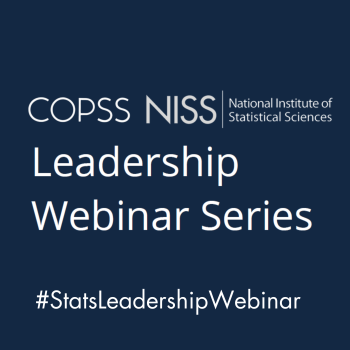
Dr. Sandra Safo, moderated a webinar on leadership in statistical research, featuring panelists Dr. Nicole Laza and Dr. Rong Chen who discussed their leadership journeys and experiences in navigating major shifts in their fields. The speakers emphasized the importance of being open to new possibilities, developing methodologies that can be used to address real-world problems, and cross-disciplinary collaboration. They also discussed strategies for pivoting research focus, rebranding oneself in academia, and the challenges and uncertainties faced by their students and colleagues.
Leadership in Statistical Research Webinar
Sandra Safo, an associate professor of Biostatistics at the University of Minnesota, moderated a webinar on leadership in statistical research. The webinar featured two panelists, Dr. Nicole Laza and Dr. Rong Chen, who discussed their leadership journeys and experiences in navigating major shifts in their fields. Dr. Laza, the department head and professor of Statistics at Penn State University, has done pioneering work on the statistical analysis of cognitive neuroscience data and has recently been using topological data methods with applications in psychology, climatology, and other areas. Dr. Chen, a professor of biostatistics at the University of Pennsylvania, combines statistical machine learning and AI research with impactful biomedical applications. Both panelists shared their insights on how to position research for success and relevance in an ever-evolving landscape.
Nicole's Journey in Statistics Leadership
Nicole Lazar, the head of the Department of Statistics at Penn State, shared her journey from a theoretical approach in likelihood theory to a more applied research direction. She highlighted the importance of being open to new possibilities, which led to her pivot in research and subsequent leadership opportunities. Nicole's experiences include being part of the push for the statistics in imaging section of ASA, chairing the section, and serving as president of the caucus for women in statistics. She emphasized the value of being open to new opportunities and considering oneself and one's options in ways that may not have been anticipated.
Qi's Academic Journey and Research Priorities
Qi discussed their academic journey, starting as a PG student in the department of statistics at the University of Michigan. They were mentored by two giants in the field, one a frequentist and the other a Bayesian. Qi emphasized the importance of developing methodologies that can be used to address real-world problems. They then discussed their work at Emory University, where they branched into new research areas, including multiomics data and EHR data. Qi highlighted the challenges of incomplete data and the need for collaboration with domain experts and quantitative data scientists. They also discussed their move to the University of Pennsylvania School of Medicine, where they founded and led the Center for Cancer Data Science. Qi emphasized the importance of cross-disciplinary collaboration and the potential of AI in biomedical research. They also discussed their current research priorities, including advancing trustworthy AI for clinical decision support and deepening industry partnerships.
Pivoting Research Focus and Rebranding
The discussion focuses on strategies for pivoting research focus and rebranding oneself in academia. Nicole and Qi emphasize that there are different levels of pivoting, from small shifts within one's expertise to major changes in research direction. They suggest that curiosity and the desire for impact are key drivers for pivoting. For early career researchers, they recommend starting with smaller pivots to balance establishing a niche with exploring new opportunities. Both speakers agree that rebranding is not necessary when pivoting; instead, they emphasize the importance of learning the language of new collaborators and demonstrating the value statisticians can bring to other fields.
Data Science Challenges in Cancer Vaccines
Qi discussed the challenges of developing data science and statistical machine learning tools for personalized cancer vaccines, concluding that the current data and technology were not ready for successful development. Nicole shared her experience of asking more questions in her new leadership role to avoid assumptions and ensure success. Qi also highlighted the importance of partnering with industry for access to resources and data, and the need to promote their work to increase visibility and credibility within the biomedical research community.
Volunteering and Professional Societies Discussion
In the meeting, Sandra led a discussion where attendees were encouraged to ask questions. Nicole answered a question about her experience and characteristics that led to her being asked to step into a role. She emphasized the importance of volunteering, being reliable, and extending one's reach through professional societies. She also shared her experience of being asked to be the department head. Sandra then asked for any other questions, and Qi clarified the term "early career" as referring to recent graduates.
Embracing Uncertainty in Career Pivots
In the meeting, Qi and Nicole discussed the challenges and uncertainties faced by their students and colleagues. They emphasized the importance of remaining committed to their institution's mission and promoting their work to the public. They also shared their experiences of navigating career pivots and encouraged others to embrace uncertainty and learn from their experiences. Nicole recommended some papers on topological data analysis, while Qi suggested watching TED Talks and Steve Jobs' commencement address for inspiration. The conversation ended with a thank you to all attendees and a promise of more events like this in the future.
